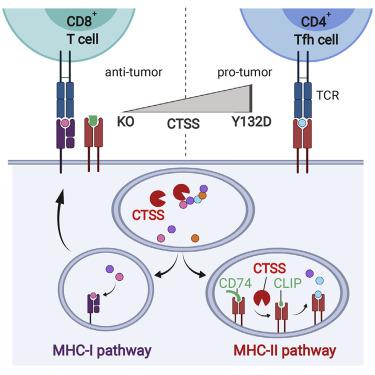当前位置:
X-MOL 学术
›
Cancer Cell
›
论文详情
Our official English website, www.x-mol.net, welcomes your
feedback! (Note: you will need to create a separate account there.)
Cathepsin S Regulates Antigen Processing and T Cell Activity in Non-Hodgkin Lymphoma.
Cancer Cell ( IF 48.8 ) Pub Date : 2020-04-23 , DOI: 10.1016/j.ccell.2020.03.016 Elie Dheilly 1 , Elena Battistello 2 , Natalya Katanayeva 1 , Stephanie Sungalee 1 , Justine Michaux 3 , Gerben Duns 4 , Sarah Wehrle 5 , Jessica Sordet-Dessimoz 6 , Marco Mina 7 , Julien Racle 8 , Pedro Farinha 4 , George Coukos 3 , David Gfeller 8 , Anja Mottok 9 , Robert Kridel 10 , Bruno E Correia 11 , Christian Steidl 4 , Michal Bassani-Sternberg 3 , Giovanni Ciriello 7 , Vincent Zoete 12 , Elisa Oricchio 1
Cancer Cell ( IF 48.8 ) Pub Date : 2020-04-23 , DOI: 10.1016/j.ccell.2020.03.016 Elie Dheilly 1 , Elena Battistello 2 , Natalya Katanayeva 1 , Stephanie Sungalee 1 , Justine Michaux 3 , Gerben Duns 4 , Sarah Wehrle 5 , Jessica Sordet-Dessimoz 6 , Marco Mina 7 , Julien Racle 8 , Pedro Farinha 4 , George Coukos 3 , David Gfeller 8 , Anja Mottok 9 , Robert Kridel 10 , Bruno E Correia 11 , Christian Steidl 4 , Michal Bassani-Sternberg 3 , Giovanni Ciriello 7 , Vincent Zoete 12 , Elisa Oricchio 1
Affiliation

|
Genomic alterations in cancer cells can influence the immune system to favor tumor growth. In non-Hodgkin lymphoma, physiological interactions between B cells and the germinal center microenvironment are coopted to sustain cancer cell proliferation. We found that follicular lymphoma patients harbor a recurrent hotspot mutation targeting tyrosine 132 (Y132D) in cathepsin S (CTSS) that enhances protein activity. CTSS regulates antigen processing and CD4+ and CD8+ T cell-mediated immune responses. Loss of CTSS activity reduces lymphoma growth by limiting communication with CD4+ T follicular helper cells while inducing antigen diversification and activation of CD8+ T cells. Overall, our results suggest that CTSS inhibition has non-redundant therapeutic potential to enhance anti-tumor immune responses in indolent and aggressive lymphomas.
中文翻译:

组织蛋白酶S调节非霍奇金淋巴瘤中的抗原加工和T细胞活性。
癌细胞的基因组改变会影响免疫系统,促进肿瘤生长。在非霍奇金淋巴瘤中,B细胞与生发中心微环境之间的生理相互作用被认为可以维持癌细胞的增殖。我们发现滤泡性淋巴瘤患者在组织蛋白酶S(CTSS)中具有针对酪氨酸132(Y132D)的复发性热点突变,可增强蛋白质活性。CTSS调节抗原加工以及CD4 +和CD8 + T细胞介导的免疫反应。CTSS活性的丧失会通过限制与CD4 + T滤泡辅助细胞的通讯,同时诱导抗原多样化和CD8 + T细胞的活化来减少淋巴瘤的生长。总体而言,我们的结果表明CTSS抑制具有非冗余的治疗潜力,可以增强惰性和侵袭性淋巴瘤的抗肿瘤免疫反应。
更新日期:2020-04-23
中文翻译:

组织蛋白酶S调节非霍奇金淋巴瘤中的抗原加工和T细胞活性。
癌细胞的基因组改变会影响免疫系统,促进肿瘤生长。在非霍奇金淋巴瘤中,B细胞与生发中心微环境之间的生理相互作用被认为可以维持癌细胞的增殖。我们发现滤泡性淋巴瘤患者在组织蛋白酶S(CTSS)中具有针对酪氨酸132(Y132D)的复发性热点突变,可增强蛋白质活性。CTSS调节抗原加工以及CD4 +和CD8 + T细胞介导的免疫反应。CTSS活性的丧失会通过限制与CD4 + T滤泡辅助细胞的通讯,同时诱导抗原多样化和CD8 + T细胞的活化来减少淋巴瘤的生长。总体而言,我们的结果表明CTSS抑制具有非冗余的治疗潜力,可以增强惰性和侵袭性淋巴瘤的抗肿瘤免疫反应。











































 京公网安备 11010802027423号
京公网安备 11010802027423号